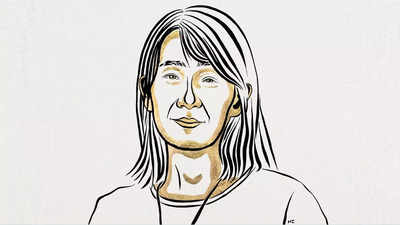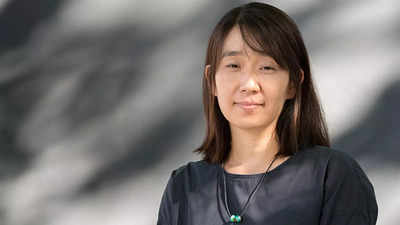The Nobel Prize in Literature for 2024 has been awarded to the South Korean writer Han Kang, recognizing him for “powerful poetic prose that confronts the trauma of history and exposes the complexity of human life.” This award places Han Kang among the great writers, reflecting his great contribution to contemporary literature. Let’s take a look at his life, career, and what makes his work so important.
Early Life and Literary Roots
Born in Gwangju, South Korea, in 1970, Han Kang’s upbringing was heavily influenced by the literary environment. He moved with his family to Seoul at the age of nine, and his father, a famous novelist, introduced him to the world of literature. Han’s exposure to books and creative stories from an early age clearly shaped his literary ideals. He studied Korean literature at Yonsei University in Seoul, strengthening his academic foundations in writing and analysis.
Despite being born into a family of writers, Han Kang developed his own unique voice, which combines poetry with prose, and explores the deepest aspects of human existence. His career began in 1993 with a series of poems published in literary magazines. However, it was in prose that he really found his expression, making his debut with a collection of short stories Love from Yeosu in 1995. This early start hinted at a unique, experimental style that would later become his hallmark.
Major Themes in His Works
One of the most distinguishing features of Han Kang’s work is his exploration of historical trauma, human vulnerability, and existential questions. His literature is often marked by a strong focus on the physical and psychological experiences of his characters. He deals with themes of violence, grief, and loss, while also delving deeply into human frailty.
His works often reflect a preoccupation with the human body, illustrating how social norms and personal histories are mapped. This appears in the novel Your Cold Hands (2002), in which a sculptor obsessively creates a plaster cast of a woman’s body, reflects artistic passion and emotional detachment. Han’s understanding of the interaction between body and soul is what gives his writing its unique depth.
International Breakthrough: The Vegetarian
Han Kang’s major international breakthrough came with his novel The Vegetarian (2007), which was translated into English by Deborah Smith in 2015. The novel tells the story of a woman, Yeong-hye, who decides to stop eating meat after experiencing a disturbing dream, which has dramatic consequences for her life. The novel is divided into three parts, each told from the point of view of a different character – none of which is Yeong-hye herself. This novel explores the themes of bodily autonomy, community expectations, and rebellion.
In 2016, The Vegetarian won the prestigious International Booker Prize, bringing Han Kang global recognition. The book is a testament to poetic prose and its ability to capture human suffering and resilience through vivid imagery and emotional depth.
Other famous works: Human action and The White Book
Han Kang Human action (2014) further strengthens his status as a literary force. The novel is based on the 1980 Gwangju Uprising, a massacre in South Korea in which hundreds of civilians were killed by the military. Han’s relationship with the city of Gwangju makes the novel both personal and political, as it deals with the aftermath of violence and trauma. At Human actionHan allows the dead to bear witness to his own annihilation, further illustrating his fascination with the boundary between life and death.
At The White Book (2016), Han becomes a more introspective form of writing. The novel is a meditative exploration of life, death, and grief, focusing on the loss of her sister, who died just hours after birth. Through a series of short lyrical fragments, Han describes loss and the passage of time, using the color white as a metaphor for purity, mourning, and transformation.
Why is Han Kang’s writing interesting?
What makes Han Kang’s work stand out is his poetic style and experimental approach to prose. He draws the line between genres, creating literary works that are part novel, part poetry. Her ability to imbue narrative with metaphorical richness allows readers to engage with difficult subjects in a profound way. He does not shy away from the harsh reality of life, but uses it to explore the deeper truths of human existence.
In the words of Anders Olsson, chairman of the Nobel committee, Han Kang’s work demonstrates “empathy for vulnerable, often female, lives,” and he has “a unique awareness of the relationship between body and soul, the living and the dead.” This dual focus on the physical and the metaphysical is a hallmark of his work, allowing him to transcend traditional storytelling methods.
Eternal Voices in Global Literature
Han Kang’s Nobel Prize in Literature for 2024 is in recognition of his innovation in contemporary prose and his ability to confront historical trauma through the lens of personal experience. His works continue to inspire and provoke, shining a light into the darkest corners of the human psyche while celebrating the resilience of the human spirit.
With a career spanning more than thirty years, Han Kang’s literary achievements have not only enriched South Korean literature but also left an indelible mark on the global literary scene.
Nobel Prize Winners in Literature (2019-2023)
This is a list of winners of the Nobel Prize in Literature from 2019 to 2023, each recognized for their unique contribution to literature. The winners create contemporary stories with powerful themes, ranging from personal memory and colonialism to poetic exploration and linguistic innovation.
Ready to lead with AI? Sign up now with GrowFast to transform your business strategy. Click here!







